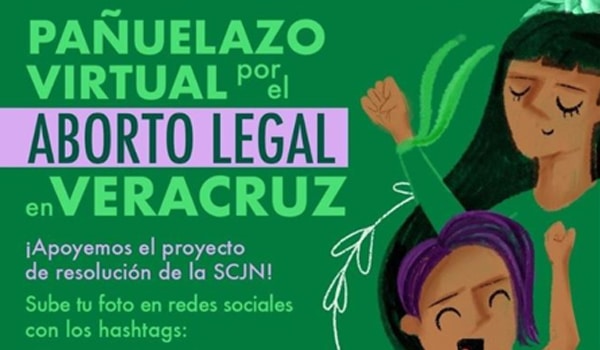
Veracruz state law allows abortion only in the case of rape, requires a police report of the rape, and the abortion must be within 90 days. In 2019, a judge in Xalapa, Veracruz, approved an injunction ordering the state’s Congress to remove articles 149, 150 and 154 of the local penal code. This would have decriminalised abortion in the first 12 weeks of pregnancy, allowed abortions for health reasons, and removed the time limit on abortion in cases of rape.
These changes were first recommended in a wide-ranging report on women’s rights, published by the National Commission to Prevent and Eradicate Violence against Women (Conavim) and the National Institute for Women (InMujeres) in 2016. The Veracruz state government accepted the proposals and the conclusions of the report in March 2017, but they did not reform the law.
The Mexican Supreme Court was asked to uphold the injunction. In a vote of four to one against, however, the Court avoided taking up the issue substantively and rejected the injunction on a so-called technical ground, that the Veracruz legislature had not failed to act on the federal government’s instruction, because there was already law on the subject. The dissenting judge argued current Veracruz law runs against the dignity and health of women and international conventions signed by Mexico.
Last week, GIRE (Grupo de Información en Reproducción Elegida) said that if the injunction were upheld, the Veracruz state congress should “modify its abortion legislation, thereby opening the doors and setting a precedent for other states to modify their local penal codes in the same terms”.
States were first given the right to set their own health policies, including abortion laws, after a 2008 Supreme Court ruling upholding Mexico City’s abortion law. In the years that followed, more than half of Mexican states enacted laws prohibiting abortion in all or most circumstances. This included Veracruz, which passed a constitutional amendment in 2016 that said life begins at conception.
In March, there was a historic protest in which thousands of Mexican women took part in a Day Without Women strike to call attention to these issues.
The governing Morena party controls most of Mexico’s state legislatures, but has been divided on the issue of abortion. Mexico’s President Andrés Manuel López Obrador has also been accused of inaction on women’s rights, including reproductive rights and gender-based violence.
SOURCES: The Star, by Associated Press, 29 July 2020 ; BBC, 29 July 2020 ; POSTER: GIRE



